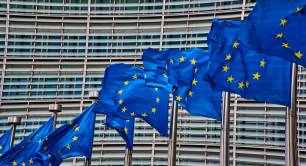Coalition led by B Lab Europe calls for mandatory stakeholder governance across the EU
- Requirement to consider all company’s stakeholders when making decisions would fit into planned European Green Deal
- First significant pan-European campaign by B Corp community
- Proposal faces resistance as “traditional industries” lobby European Commission
A coalition of 60 companies led by B Lab Europe is calling for an EU-wide change in company law to make stakeholder governance mandatory in the bloc.
The Interdependence Coalition, launched yesterday at the first B Corp Climate Summit, aims to put pressure on the EU Commission to consider the change as part of its Sustainable Corporate Governance initiative.
The Sustainable Corporate Governance initiative’s goal is to improve the EU regulatory framework on company law and corporate governance, to help companies focus on long-term sustainable value creation rather than short-term benefits.
The Commission started a consultation on the subject in late 2020 and is due to publish a directive proposal after the summer.
“We really have a massive opportunity in Europe,” Katie Hill, executive chair of the management board at B Lab Europe, said at the launch. “We were so keen to seize the moment that the European Union opened up as they debated how companies should be governed and managed, to ensure that we make the changes we need to meet this existential crisis.”
We really have a massive opportunity in Europe
The coalition’s core proposal is that all companies registered within the EU should be required (and not just allowed) to consider the interests of all of the company’s stakeholders when making business decisions.
This requirement should be aligned with the obligations of investors to consider how their capital will be used to impact society and the environment. “That combination is critical to change the behaviour of both management and boards of directors, so that we don't have a disconnect between different elements of the business cycle and the business contributors,” Hill added.
The coalition is calling for a change in EU-wide company legislation, meaning all member states would have to abide by it. It also asks the Commission to embed in the directive the legal obligation to consider the environment as a stakeholder.
Resistance expected
Hill said the coalition expected “some resistance” to the proposal, as some investors had already expressed concerns that such requirements could reduce competitiveness. “This requires a completely, totally different refocus on the culture of business and on the role and responsibilities that businesses carry, and how they hold themselves and are held accountable, which will be underpinned in this new regulation we seek to see adopted.”
Alberto Alemanno, professor of law and public policy at HEC Paris and founder of The Good Lobby, who worked on the coalition's proposal, said the Commission’s ambitions appeared “very broad” when it first launched its consultation last year. But while the consultation had been “very democratic”, he said that he had witnessed “a major increase of corporate lobbying from traditional industries” and that “a few industries, not necessarily representative of the European business community” had “partially hijacked” the conversation. One should “remain vigilant” to make sure the Commission kept its initial levels of ambition, he added.
This requires a completely, totally different refocus on the culture of business and on the role and responsibilities that businesses carry
The coalition numbers 60 European B Corps, including WeTransfer, Impact Hub and Tony’s Chocolonely. Alemanno said of the campaign: “This is an important moment for the B Corp community across Europe, as it is the first time that a fully fledged campaign has been launched at the pan-European scale.” The B Corp model had a huge potential in designing the European Green Deal – a broad package of EU reforms aimed to build a sustainable economy – which he called a “Copernican revolution”.
Hill said B Corps were a “testbed for the concept” of stakeholder governance and that the EU Commission should look at them as an example that it works. B Corps “have shown that this is not just good for business but actually powerful for society and the environment too,” she added. As a major global economic power, the EU’s position could have an impact beyond its borders, she said.
B Lab Europe is part of B Lab, the non-profit organisation that oversees B Corp accreditations. More than 4,000 companies worldwide have achieved B Corp status (which requires meeting strict sustainability and impact standards), with 650 in Europe.
Similar coalitions have recently emerged elsewhere in the world. In April, a coalition of more than 50 impact-focused organisations called for a new White House initiative to reform the economy and capital markets. The initiative would support a shift from shareholder primacy to stakeholder capitalism and an increased focus on community investing.
In May, an international working group led by Sistema B, the Latin America arm of B Lab, launched a campaign for a “triple impact” economic recovery in the region.
Thanks for reading Pioneers Post. As an entrepreneur or investor yourself, you'll know that producing quality work doesn't come free. We rely on our subscribers to sustain our journalism – so if you think it's worth having an independent, specialist media platform that covers social enterprise stories, please consider subscribing. You'll also be buying social: Pioneers Post is a social enterprise itself, reinvesting all our profits into helping you do good business, better.



